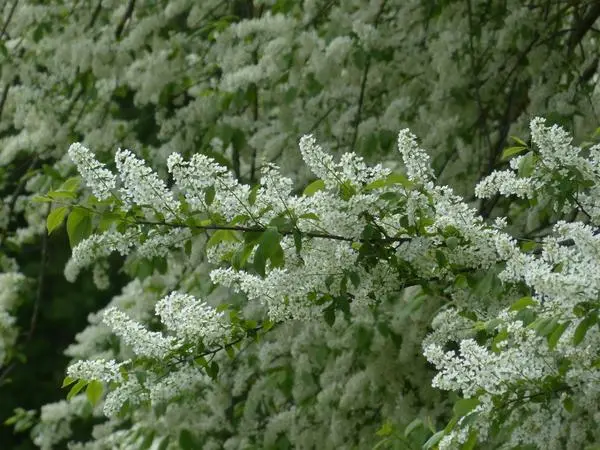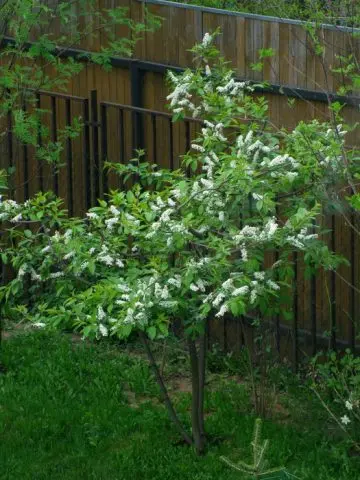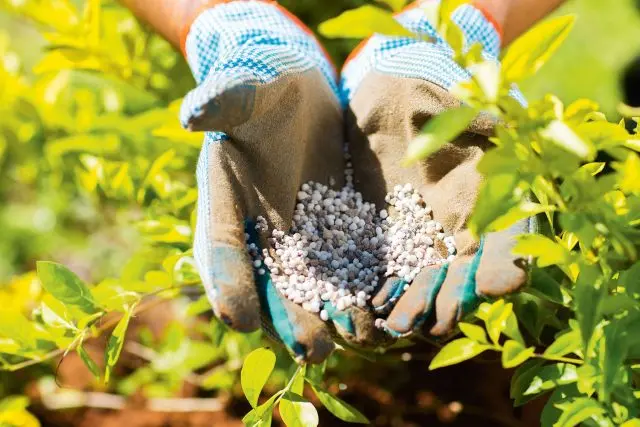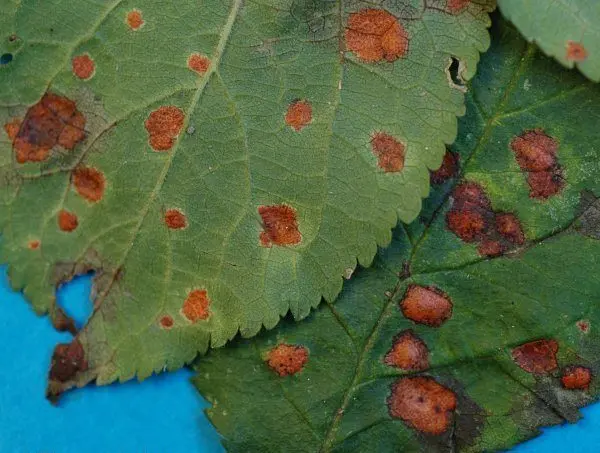Contents
It is difficult to find a person who is indifferent to the flowering bird cherry. Shrubs or a tree look decorative at any time of the year. But the plant is especially beautiful at the time of flowering. That is why bird cherry can be seen in the gardens of many s. How to properly plant bird cherry will be discussed further.

Where can you plant cherry
In order for the bird cherry planted on the site to please the eye, you need to choose the best place for it. This plant is grown as a tree or shrub. But in any case, a wide and sprawling crown is obtained.
Bird cherry itself is a plant that creates good shading. But for its planting, you need to choose well-lit, open areas. In the shade, the shoots of the plant are strongly elongated, so flower buds will form only on the tops, from which the decorative qualities of bird cherry are lost.
The plant prefers slightly acidic or neutral soils. They can be sandy, clayey. A very good indicator when choosing a landing site is the close occurrence of groundwater. After all, bird cherry grows better on moist soils.
When planting, one should take into account the strong growth of the plant, therefore it is undesirable to plant bushes in the immediate vicinity of other cultivated trees and shrubs.
Is it possible to plant bird cherry on the site
You can plant any trees and shrubs on the site, including bird cherry. When planting bird cherry seedlings, some gardeners make gross mistakes, which are then not so easy to fix. In no case should plants be placed next to currants and gooseberries.
The fact is that bird cherry growing in the garden is damaged by many pests and diseases that migrate to other cultivated plants in the garden. Aphids are very annoying to this plant. These pests literally stick around young shoots and tassels with flowers.
Is it possible to plant bird cherry near the house
It is not recommended to plant bird cherry in the immediate vicinity of the house:
- The strong aroma of the flowering plant is an allergen.
- Tall bushes or trees cover the light, not letting it into the living space.
- If bird cherry is planted close to the house, then the wall will be constantly damp, which can provoke the development of the fungus.
- The bird cherry root system is powerful, it grows in depth and width. If the plant is located in close proximity to the house, it can damage the foundation.
What plants are planted next to the bird cherry
Near the bird cherry, according to gardeners, you can plant almost all garden plants. It is difficult to avoid defeat, as many diseases and pests move through the air and are carried by the wind. Therefore, a plant with fragrant flowers can be planted in the garden, you only need to process the plantings simultaneously with other crops from diseases and pests.
When can you plant bird cherry: in spring or autumn
Bird cherry seedlings can be planted in spring or autumn. But experienced gardeners recommend giving preference to autumn reproduction. It is at this time that the soil is saturated with a sufficient amount of moisture and nutrients.

How to plant bird cherry on the site
It is not difficult to plant bird cherry seedlings on the site. It is only necessary to take into account that strongly growing bushes and trees are located at a distance of at least 5 m. A hole is dug of such a size that the root system is freely placed in it.
Before planting, bird cherry seedlings are carefully examined. Any damaged roots are cut off, long ones are shortened. If the seedling has many shoots, leave the largest and most developed, but not more than 2 pieces. They are shortened to 50-60 cm.
Peat, dry leaves, humus and mineral fertilizers are poured into the bottom of the pit. The composition is thoroughly mixed.
A 12 cm layer of earth is poured on top, a mound is made and a plant is planted on it. The roots are straightened, sprinkled with earth.
The soil is well compacted, plentiful watering is carried out. To retain moisture, the pit must be mulched with peat or sawdust.
Good care rules
Bird cherry is an unpretentious plant, so planting and care do not create any problems. All events are traditional:
- watering, fertilizing and loosening;
- crown formation;
- protection from diseases and pests.
How to water
Bird cherry plantings do not need regular watering, which is very convenient for gardeners. In a typical summer, 20-30 liters of water are poured under each plant. If the summer is dry, then the amount of liquid is increased, but the frequency is not changed. In addition, it is recommended to perform sprinkling. This procedure saves the green mass and brushes with berries from drying out.
How to feed bird cherry
Caring for bird cherry is easy. A plant, like any garden crop, needs to be fed. Although the procedure is optional, to prevent diseases and increase life expectancy, experienced gardeners feed plantings from time to time.
Bird cherry bushes or trees can be fed with mineral or organic fertilizers. They are applied in spring or autumn. In the spring, it is better to feed the plants with saltpeter or urea. In autumn, pour bird cherry with superphosphate or potassium salt.
From organic matter, humus or peat is used as mulch, as well as wood ash, rich in trace elements.
Plants are fed with mineral fertilizers only at the root, it is necessary to exclude the ingress of drugs on the green mass. Recommendations for the use of the fertilizer are indicated on the packaging. You need to carefully read the instructions and strictly follow it when diluting the solutions.

How to cut bird cherry
Bird cherry is grown not only for fragrant flowers and healthy berries. The main purpose is decorative. In order for the plants to become a real decoration of the garden, it is necessary to cut the branches in a timely manner. In addition, a timely procedure helps save trees or bushes from diseases and pests.
Sanitary pruning is carried out in spring and autumn. First of all, damaged shoots and branches are removed, then those on which pests have accumulated.
Throughout the season, growing shoots must be cut out, as they draw nutrients and moisture from the soil. In addition, aphids often settle on young shoots.
To give decorativeness, formative pruning is carried out. The fact is that bird cherry is grown in the form of a tree or shrub. Therefore, it is necessary to prune plants from the moment of planting in different ways.
How to form a shrub:
- On the first tier, shoots are shortened at a height of 0,7-0,8 m from the ground.
- When new shoots appear next year, the most developed ones are left, they are cut in exactly the same way.
- As a result, by the 3rd year, a bush appears with symmetrically arranged shoots in several tiers.
Tree formation rules:
- One most developed trunk is left, all shoots and branches located below are cut out.
- All places of cuts, regardless of whether a bird cherry tree is formed in spring or autumn, are treated with a garden var.
How to get rid of bird cherry on the site
It is easy to plant bird cherry on the site. But in the future, a lot of trouble arises, since the plant annually produces a large number of shoots extending from the root. In addition, young shoots around the plant appear from fallen berries.
If you do not take appropriate measures, young bushes will flood the entire area. There are a number of measures by which you can get rid of unnecessary plantings.
Physical method
If you can wait with the removal of bird cherry, then you can use the following method:
- At the beginning of summer, cut down the trunks of bird cherry at a height of 130 cm from the root.
- Remove all shoots on the trunks, the same should be done when new branches appear.
- After 3 years, a dry stump will remain from the bird cherry, which is easy to uproot.
Chemical method
If you need to remove bird cherry plantings quickly, then this method is what you need. They take chemicals, for example, “Hurricane” or “Tornado”. A concentrated solution is prepared from them and the plants are sprayed on the leaves, at the same time the root zone with young shoots.
Destruction begins immediately after the poison penetrates the leaves, and then spreads to all cells. As a result, the bird cherry dries up by winter, it remains only to remove it from the site.
Diseases and pests of bird cherry

According to some gardeners, bird cherry, like a magnet, attracts various diseases and pests. In fact, the susceptibility of the plant is almost the same as that of other horticultural crops. Preventive measures and means of combating harmful insects will help to avoid problems.
From the diseases are distinguished:
- leaf spot;
- powdery mildew;
- cytosporosis;
- wood rot;
- pockets of flowers and fruits.
Plants suffer from such pests:
- bird cherry aphids and bedbugs;
- odd silkworm;
- hawthorn and ermine bird cherry moth;
- weevil beetle.
For the treatment of plants from pests, a solution of “Karbofos” is used. For 10 liters of water, 60 g of the product is enough. As a preventive measure, plantings are sprayed twice a season. Consumption per plant – 2 liters. Treatments can be repeated in case of pest invasion.
Diseases of bird cherry, signs and methods of treatment.
Disease | Evidence | How to process |
Cytoplasmosis | The disease manifests itself on the trunk and branches. These parts of the bird cherry gradually dry out. You can recognize the disease by small white tubercles. These are pycnidia of the fungus. In the rainy season, red threads appear from them. | As soon as the disease begins to manifest, it is necessary to cut off all damaged parts and burn. For prevention in early spring, while the leaves have not yet blossomed, the bird cherry should be treated with copper oxychloride or a 1% solution of Bordeaux liquid. In March, bird cherry trunks should be washed with a solution of iron sulphate, then whitewashed with lime |
wood rot | The cause of the disease is tinder fungus. Spores enter through wounds and cracks that form in the bark | It is possible to save bushes or trees only at the initial stage of the disease. Treatment begins with cleaning the affected areas and sealing them with clay combined with fungicides.
|
Flower and fruit pockets | The fungus infects bird cherry. Because of this, deformation of flowers and fruits occurs. The berries do not form bones, they have a noticeable plaque, which is a bag of the fungus | Treatment is to remove the affected parts of the plant. As a preventive measure, plantings before flowering should be treated with a 3% solution of ferrous sulfate or 1% Bordeaux mixture. |
Mučnistaâ rosa | A white coating in the form of a cobweb appears on the bird cherry. Then dark spots appear on the trunks and leaves – fruiting bodies | Plantings are treated in spring and autumn with special preparations. |
Rubella or polystigmosis (red leaf spot) | Due to the development of the fungus, the leaves become covered with red spots.
| You can destroy the disease with a 3% Nitrofen solution or copper sulfate until the leaves have blossomed, then before flowering. The third time spraying with fungicidal preparations is planned 2 weeks after the end of flowering. |
Cerkosporoz | The causative agent of the disease is located on both sides of the leaf blade. On the upper side, the necrosis is whitish, below – greenish-brown. During the development of the disease, the affected areas merge, causing the sheet tissue to fall out. | To combat the disease, Topaz is used, which is used according to the recommendations. |
Conclusion
You need to know how to plant bird cherry in order to grow a plant with fragrant flowers and useful berries. It does not present any difficulties in growing and caring. But the prevention of diseases and pests should never be forgotten so that a tree or shrub does not lose its decorative effect.









